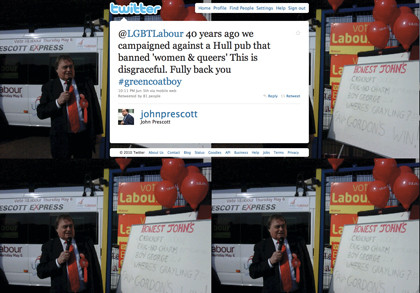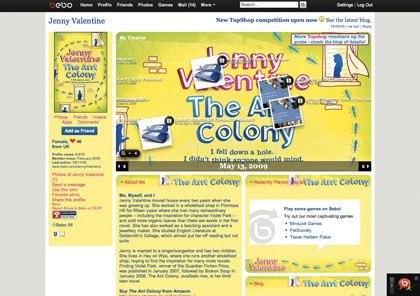Campaigns such as the Maclaren one occur in multiple media, encompassing blogs, email and one or more social networks. In addition to targeting the right blogs, you also need to choose the right social network or networks, because each service has very different users.
New media marketing expert Brian Solis has put together an excellent analysis of the various different networks' demographics, and while it's for the US – instead of Friends Reunited, Solis has Classmates.com – the data gives a vivid picture of who uses what.
Solis reports that while 40 per cent of Bebo's users are under 17, 61 per cent of Facebook's users are over 35. And it's not just age that differentiates social networks. The business network LinkedIn skews towards an older demographic and its users tend to be reasonably well-off and well educated, while MySpace users tend to be more rural than Facebook ones, and they tend to be poorer too.

HIGH-PROFILE SUPPORT: After homophobic abuse, a gay and lesbian society's Twitter posts attracted high-profile support
There are also dramatic differences in users' interests: in a fascinating study by advertising network Chitika, users of MySpace, Facebook, Twitter and Digg had very different priorities. MySpace users aren't interested in news but love videogames and celebrity gossip; Twitter users are more interested in news than Facebook users; and Digg users, unsurprisingly, like technology related content more than users of the other three networks. The full analysis is well worth reading and you can find it at www.chitika.com/research/2010.
Luck and libel
Luck plays a huge part in any campaign, and if you're really lucky, your chosen target will overreact. That's exactly what Nestlé did when Greenpeace supporters criticised it on its Facebook page in March.
Sign up for breaking news, reviews, opinion, top tech deals, and more.
When users parodied its logo in their profile pictures, Nestlé ordered them to stop. "Please don't post using an altered version of any of our logos as your profile pic," it told users. "They will be deleted." Inevitably, the page was promptly flooded with logo-modifying posters, and the newspapers picked up the story.
To its credit, Nestlé apologised – albeit belatedly – and said: "Social media: as you can see we're learning as we go. Thanks for the comments."
Nestlé was a victim of The Streisand Effect, named after Barbra Streisand's attempt to suppress photos of her house. Instead of hiding the pictures, her attempts simply made their existence more public, and owning a copy more desirable.
On a wider level, the term refers to times when some person or company tries to censor information, usually something embarrassing, only for the backlash to give it far more publicity than it would ever have generated on its own. Firms are generally aware of the effect, which is good news for the armchair activist – most companies know that if they try to shut you up, you'll shout all the louder, and when a problem reaches critical mass, there's nothing they can do.
That doesn't mean you can say whatever you like without consequences, though – you need to make sure you're not breaking the law, or annoying someone with deeper pockets than you.
In May, Paul Chambers was fined £1,000 for a jokey Twitter message in which he vowed to blow Robin Hood Airport "sky high". The message fell foul of the Communications Act 2003, under which it's illegal to send indecent, obscene or menacing communications. "Only joking", it seems, isn't a valid defence.
You need to watch out for libel, too – if your facts are wrong and you defame a person or organisation, you could be sued silly. Just ask 21-year-old Justin Kurtz, who created a critical Facebook page about T&J Towing when they towed his car away. He's now being sued for $750,000 by the towing firm, which claims that Kurtz and his page's thousands of users have defamed the firm and lost it business.
In another lawsuit, Horizon Realty Group sued a former tenant, Amanda Bonnen, for $50,000 over a single tweet. Bonnen posted: "Who said sleeping in a moldy [sic] apartment was bad for you? Horizon Realty thinks it's okay." Horizon wasn't amused and deployed the attack lawyers.
Although both libel suits were filed in the US, don't think you're safe because you're in the UK. We have a long tradition of overseas individuals and companies suing UK residents in the UK courts.
You don't need to be the originator of a libellous statement, either: under UK law, simply repeating a defamatory allegation is libellous. Worst of all, under the current system, it doesn't matter whether you've libelled someone or not: even if you're entirely innocent, the cost of defending yourself could easily bankrupt you. Choose your targets, and your comments, very carefully.
Strength in numbers
So can you really make a difference with a social media campaign? If you don't have the numbers behind you, the answer is no: you're as unimportant, and easy to ignore, as someone writing angry letters to the managing director. But even if you do have lots of like-minded people on your side, that doesn't necessarily mean you'll change anything.
Online petitions don't work, and Facebook pages aren't much more effective. One of the most visible examples is the #nickcleggsfault tag on Twitter, which parodied newspapers' anti-Lib Dem front pages, and the very visible use of social media by Lib Dem MPs and their supporters. The papers didn't stop attacking the party, and the Lib Dems didn't gain any more seats: in 2005 it had 9.6 per cent of Parliamentary seats, but in 2010 that fell to 8.8 per cent.
The truth is that even if you do get massive online support, success isn't guaranteed. While outraged Twitter users successfully got Danny Dyer's column in Zoo magazine pulled over offensive comments, the much bigger and higher-profile Twitter campaign trying to get Daily Mail journalist Jan Moir fired was ignored.

BEBO: Different networks have very different demographics. Bebo's audience largely consists of under-17s, while Facebook users are mainly over 35
Similarly, while some firms take blog-based criticism very seriously, others don't. For example, Ryanair says that "it is Ryanair policy not to waste time and energy in corresponding with idiot bloggers". In much the same way that films such as Sex and the City 2 are critic-proof, with people flocking to see them despite uniformly awful reviews, some firms may be social media-proof.
The good news is that such firms will become rare. In the US, PR firm Burston Marsteller reports that 79 per cent of Fortune 100 companies use at least one social network, with 65 per cent running at least one Twitter account. Over here, Virgin Media Business says that 57 of the FTSE 100 companies have currently signed up to the micro-blogging service, but just 16 of them use it to respond to customers.
That lack of concern will have to change, says Customer Service Director Phil Stewart, who compares unanswered tweets to an unanswered phone. "In fact, it is a lot worse," he explains. "This lack of interaction can be viewed by millions."
Twitter accounts are likely to become an increasingly common way for firms to communicate – and for us to complain. "We are seeing a much more transparent face to traditionally secretive companies," Curry says. "Those not willing to face social media are being seen as obsolete. The people have spoken – and they want to be @replied to."
- 1
- 2
Current page: Choosing the right social networks
Prev Page How to start a successful Twitter campaign